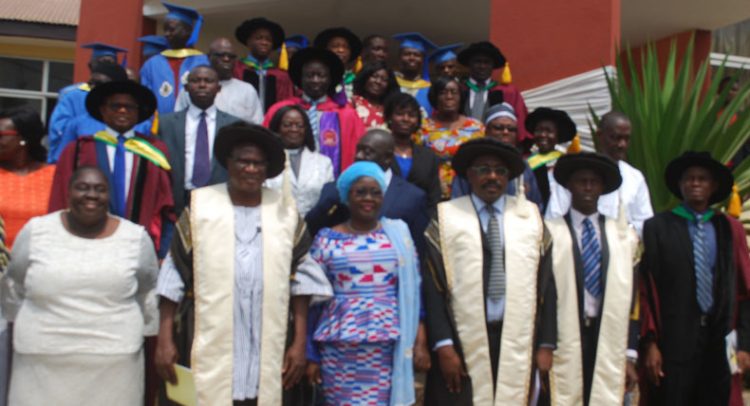The dignitaries with the graduates
Dr Dadson Awunya-Vitor, Director of the Institute of Local Government Studies (ILGS), has indicated that the institute has received accreditation from the National Accreditation Board (NAB) to start three Bachelors and Diploma programmes.
The programmes are Bachelor of Arts in Community Development, Bachelor of Arts in Social Protectection, Bachelor of Arts in Public Sector Management and Diploma in Community and Social Development.
According to him, the Bachelor of Arts in Community Development will be offered by the Rural Development College in Kwaso in the Ashanti Region.
Speaking at the ILGS third congregation for 114 students last Saturday, he indicated that the institute has also applied for international accreditation with the International Commission on Accreditation of Public Administration and Training Programmes (ICAPA in order to become a world-class institution, among others.
Forty students graduated with MA Local Government Administration and Organization, 16 with Msc Financial Management, 26 with Msc Local Economic Development and 32 with Msc Environmental Science, Policy and Management.
“As you leave the four corners of this great institution to enter the world of work, remember to uphold the core values of our institute which are Integrity, Creativity, Leadership and Service,” he told the students.
Speaking on the theme for the third Congregation, “Twenty Five Years of Sustained Constitutional Governance in Ghana: Successes, Challenges and Prospects of Decentralization” Dr Esther Offei-Aboagye, former Director of ILGS, indicated that the decentralization process has demonstrated to Ghanaians that governance can be brought to their doorsteps.
The assembly system has provided the citizens with additional and alternative channels of representation, she mentioned.
According to her, laws have been developed to give assemblies powers and responsibilities for legislating and planning, among others.
The passage of Act 936 seeks to, among others, bring all relevant legal provisions under one cover.
“Notwithstanding the above, there are a couple of challenges which have evolved over the years,” she stated.
Dr Ofei-Aboagye urged assemblies to think widely, strategically and plan holistically on a long-term basis and introduce result-oriented programmes.
By Solomon Ofori


